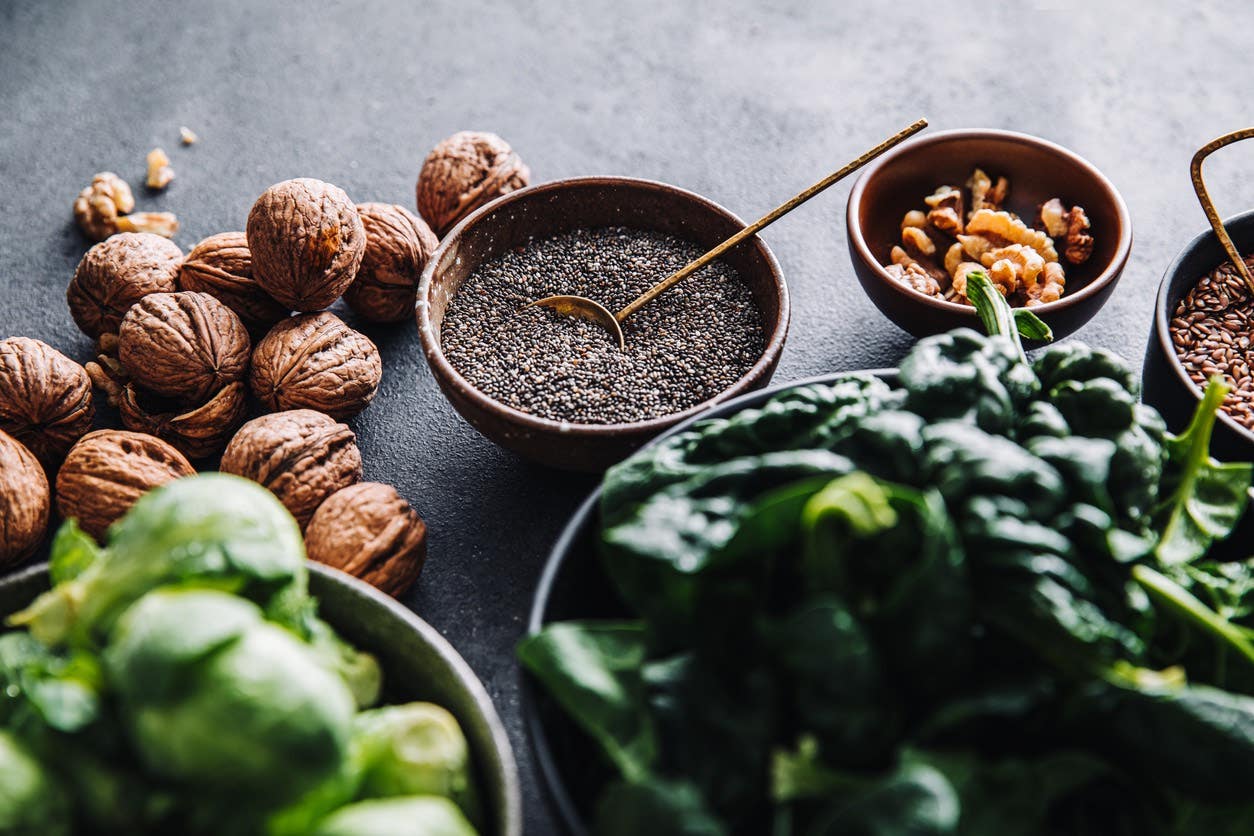
Omega-3s, Explained: What Plant-Based Eaters Should Know
Need clarity on where omega-3s fit into your whole-food, plant-based diet? We dug into the research and spoke with James Loomis, M.D., FACLM, medical director of Barnard Medical Center, to get the lowdown on where to find them and how to make sure you're getting enough. (Spoiler alert: You don’t have to eat fish to reap the benefits of these healthy polyunsaturated fats!)
What Are Omega-3s?
Omega-3s are essential fatty acids, meaning our bodies need them but can’t make them on their own, so we must get them through our diet. They come in three main forms: alpha-linolenic acid (ALA), eicosapentaenoic acid (EPA), and docosahexaenoic acid (DHA). The body uses EPA and DHA directly, but it must convert ALA into EPA or DHA to be able to put it to work.
EPA and DHA support many essential functions in the body from head to toe—brain, cardiovascular, immune, skin, and metabolic—and contribute to maintaining long-term health. They work through a variety of mechanisms, one of which is moderating inflammation.
If the Body Can’t Make Omega-3s, Where Do They Come From?
Omega-3s originate in plants. ALA is found in land plants. DHA and EPA are found in sea plants, specifically in the microalgae found in phytoplankton.
So Why Does Everyone Talk About Eating Salmon to Get Enough Omega-3s?
When fish eat microalgae or eat smaller fish that feed on microalgae, they accumulate DHA and EPA in their fat stores—which is why fatty fish such as salmon, sardines, anchovies, mackerel, tuna, halibut, and herring are often seen as go-to sources of omega-3s. But fish are far from an ideal source, says Loomis. “The problem is that when we eat fish to get omega 3s what else do we get? … There are things you don’t want, like mercury, microplastics and a little bit of saturated fat. Plants by far give you the biggest return on investment that you can get when you’re thinking of your health.” Sourcing your omega-3’s directly from plants is also better for the environment, Loomis notes. “There’s a huge sustainability issue with fish.”
What Whole Plant Foods Are the Best Sources of Omega-3s?
Excellent plant sources of ALA include walnuts, ground flaxseeds, chia seeds, and hemp seeds. “I put [ground] flaxseed or chia seed on oatmeal, chia seed in my recovery shake, and hemp seeds in my salads,” says Loomis.
Other whole plant foods contain smaller amounts of ALA, which contribute to your overall intake of omega-3s along with vitamins, minerals, fiber, antioxidants, and phytochemicals. For example, leafy greens contain omega-3 fats, but because they’re so low in fat overall, you’d need to eat 20 to 30 cups to get a meaningful amount.
How Can Plant-Based Eaters Optimize Omega-3s?
In general, the conversion process from ALA to EPA and DHA is inefficient: The body converts ALA to EPA at a rate of 5-15% and less than 1% reliably converts to DHA, according to the Academy of Nutrition and Dietetics. That’s why, beyond just consuming ALA-rich plant foods, it’s important to help your body make the most of ALA.
Eating a varied low-fat, whole food, plant-based diet—rich in fruits, vegetables, whole grains, beans, legumes, nuts, and seeds—can enhance the liver’s ability to convert ALA to EPA and DHA, a process that becomes less efficient when key nutrients are lacking or when the diet is high in alcohol or competing fats. When the diet is high in omega-6 fats—from sources like vegetable oils, fried foods, and ultraprocessed snacks—less ALA gets converted because the enzyme needed for the process is already busy handling the excess omega-6s. A classic Swiss study found that a high-fat diet reduced conversion by 40–50%.
Non-dietary factors are also at play, including genetics, health status, gender, and age; young women tend to convert more efficiently because the body needs higher levels to support a healthy pregnancy. If you want to know your levels, you can ask your doctor or order a home-based test.
Are Supplements Ever Necessary?
Researchers are still investigating whether plant-based eaters could benefit from taking algae-based DHA and EPA supplements.
According to a paper in the Medical Journal of Australia, some vegetarians may benefit from supplementation, including pregnant and breastfeeding women, infants and young children, and older adults with chronic diseases—like diabetes, hypertension or metabolic syndrome—that dampen the rate of conversion. People with high cholesterol or heart disease and endurance athletes may also consider supplements to reduce inflammation, says Loomis.
Because vegans tend to have low blood levels of DHA and EPA, plant-based doctors and nutritionists are increasingly recommending boosting levels with an algae-based supplement of combined DHA and EPA. “[Considering] that long chain omega-3s DHA and EPA have specific benefits for the brain and heart, it may be worthwhile to consume plant-based algae supplements that contain these omega-3s,” says Sharon Palmer, MSFS, RDN, author of The Plant-Powered Diet. “Personally, I take algae DHA/EPA supplements daily.” In terms of dosage, Palmer says the general recommendation for adults is about 250 mg daily—though she adds that there’s no universally agreed upon allowance for omega-3s, and needs can vary. “It’s important to discuss the use of dietary supplements with your healthcare provider,” Palmer says.

About the Author

About the Author
Dana Hudepohl
Join our mailing list
Get free recipes and the latest info on living a happy, healthy plant-based lifestyle.
By providing your email address, you consent to receive newsletter emails from Forks Over Knives. We value your privacy and will keep your email address safe. You may unsubscribe from our emails at any time.